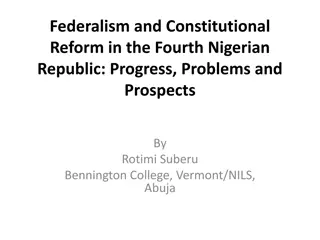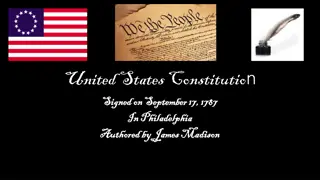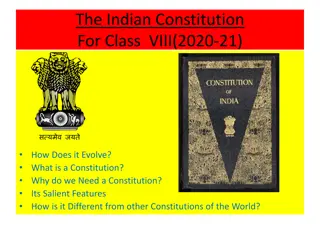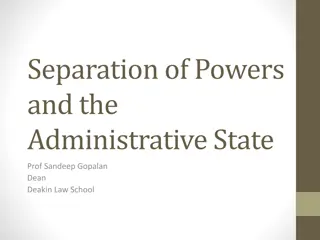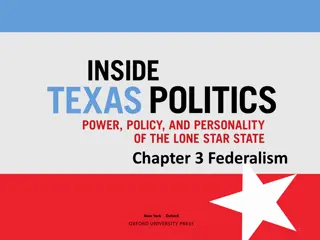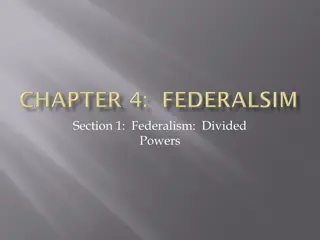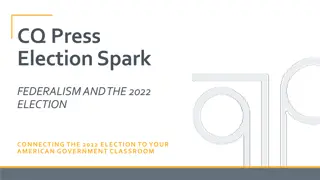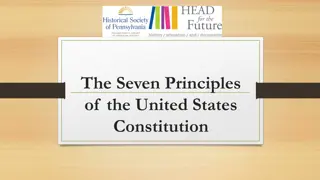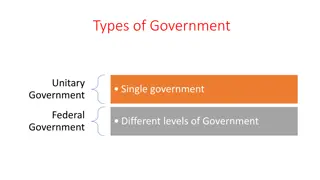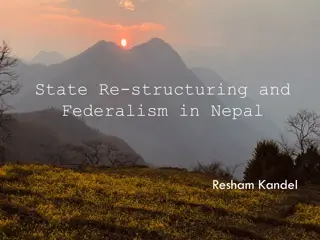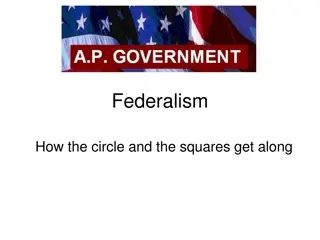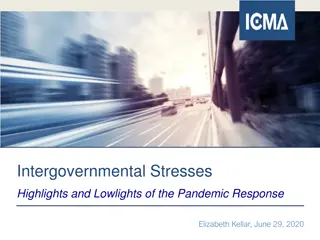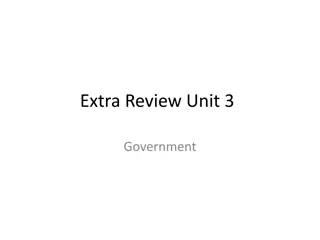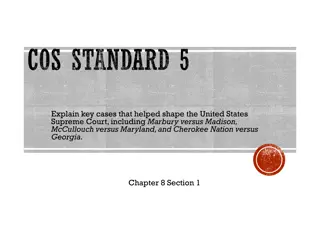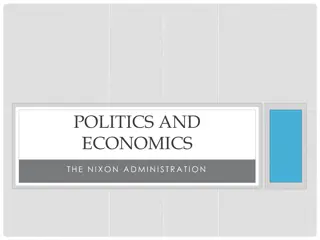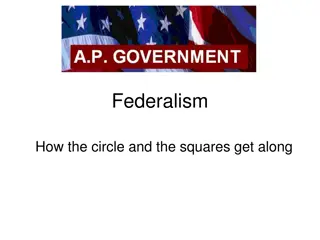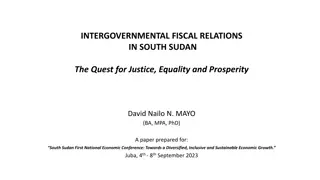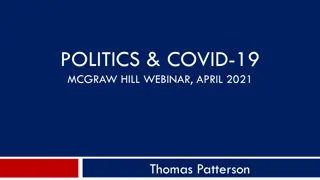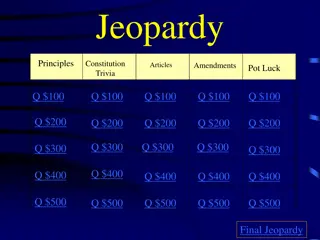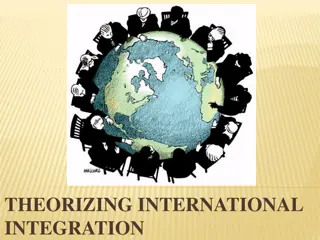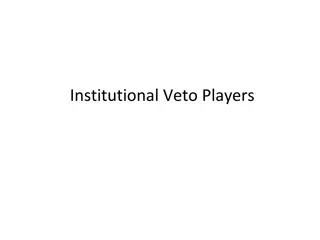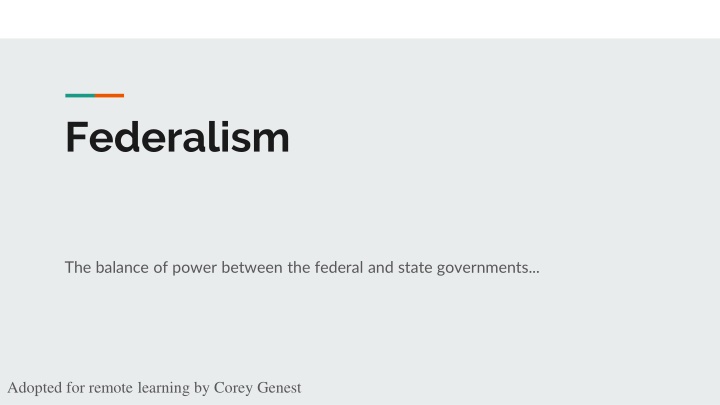
Compromise in Federalism and the U.S. Constitution
Explore the concept of compromise in federalism and the U.S. Constitution through lessons shared by Justice David Souter and attorney William Chapman. Discover the importance of compromise in governance, as exemplified by the Constitutional Convention of 1787, and its impact on society.
Download Presentation

Please find below an Image/Link to download the presentation.
The content on the website is provided AS IS for your information and personal use only. It may not be sold, licensed, or shared on other websites without obtaining consent from the author. If you encounter any issues during the download, it is possible that the publisher has removed the file from their server.
You are allowed to download the files provided on this website for personal or commercial use, subject to the condition that they are used lawfully. All files are the property of their respective owners.
The content on the website is provided AS IS for your information and personal use only. It may not be sold, licensed, or shared on other websites without obtaining consent from the author.
E N D
Presentation Transcript
Federalism The balance of power between the federal and state governments... Adopted for remote learning by Corey Genest
Compromise On the following slide, please complete the Frayer model to help with your understanding of the definition of compromise. To the right is a short video that explains how to create a Frayer model if you are unsure how to do so.
[type here] [type here] Definition Characteristics Compromise Examples Non-examples [type here] [type here]
Constitutionally Speaking: A Lesson in Compromise Retired U.S. Supreme Court Justice David H. Souter and New Hampshire attorney William Chapman emphasize the critical role of compromise in the design and adoption of the U.S. Constitution. A Lesson in Compromise Justice David Souter
A Lesson in Compromise: Questions (1) According to Justice Souter, what did James believe was the most serious issue facing the Constitutional Convention in 1787? Do you agree or disagree with Justice Souter's assessment? Why? [type answer here] Madison
A Lesson in Compromise: Questions (2) What were some of the compromises made by the delegates at the Constitutional Convention of 1787? Are there any common themes you can identify? [type answer here]
A Lesson in Compromise: Questions (3) So compromise matters, it's fundamental to debate, to the way we govern. We've seen, I think both at the national level and here in New Hampshire, what happens when people are unwilling to compromise." - William Chapman, Esq., Shareholder, Orr & Reno What did Attorney Chapman mean when he stated that compromise is "fundamental to debate, to the way we govern"? Provide a recent example in which government officials were unwilling to compromise and describe how the lack of compromise affected the government and our society. [type answer here]
What compromises were made during the creation of the U.S. Constitution and why were those compromises necessary? A More Perfect Union Think about this question as you read the document on the right.
Federalism A system of government where power is divided between a national government and smaller regional governments (i.e. state governments in the United States). In the United States, the national or federal government has exclusive power in some areas, the state governments have exclusive power in some areas, and the two levels of government share power in other areas. This is called a federal system of government.
Federal Powers Granted Shared Powers State Powers Granted [type here] [type here] [type here] Construct a chart illustrating powers granted to and shared by state and federal government.
Federal Powers Denied Denied Powers to both State Powers Denied [type here] [type here] [type here] Construct a chart illustrating powers denied to state and federal government.
[enter answer to question 1 here] 1. When a state passes a law contradicting a federal law, which law has supremacy? Where in the Constitution is this issue addressed? Are there powers delegated to the federal government that you think should be left to the states? If so, why? Are there powers reserved to the states that you think should be exercised by the federal government? If so, why? Is a sharing of some powers between the federal and state governments an effective way to govern? Why or why not? [enter answer to question 2 here] 2. 3. [enter answer to question 3 here] 4. [enter answer to question 4 here]
Analyzing the Necessary and Proper Clause and the Commerce Clause of the Constitution
SCOTUS Rulings Necessary and Proper Clause McCulloch v. Maryland (1819) Text Summary U.S. v. Comstock (2010) Full Please choose two of the cases on the right to review. After reading, you must provide analysis by answering the following questions: Full Text Summary Commerce Clause a) The facts of the case, including the federal law or action that is at the center of this case. The central question of the case? (i.e. The Supreme Court must decide if... ) The ruling of the Court. How the text of the Constitution was interpreted to support the Court s ruling. Gibbons v. Ogden (1824) Text Summary Full Swift v. U.S. (1905) b) Full Text Summary Schechter Poultry Corp. v. U.S. (1935) Full Text Summary NLRB v. Jones (1937) Full Text Summary Wickard v. Filburn (1942) Full Text Summary U.S. v. Lopez (1995) Text Summary U.S. v. Morrison (2000) Full Text Summary Affordable Care Act cases (2012) Full Text Summary c) d) Full
[enter answer here] a) Which case did you choose for the Necessary and Proper Clause and what are the facts of the case, including the federal law or action that is at the center of this case.
[enter answer here] b) What is the central question of the case? (i.e. The Supreme Court must decide if... )
[enter answer here] c) What was the ruling of the Court.
[enter answer here] d) How was the text of the Constitution interpreted to support the Court s ruling.
[enter answer here] a) Which case did you choose to for the Commerce Clause and what are the facts of the case, including the federal law or action that is at the center of this case.
[enter answer here] b) What is the central question of the case? (i.e. The Supreme Court must decide if... )
[enter answer here] c) What was the ruling of the Court.
[enter answer here] d) How was the text of the Constitution interpreted to support the Court s ruling.
Voting Rights and the Constitution To start, on the following slide please complete the graphic organizer to develop a definition of voting.
[type here] [type here] Definition Characteristics Voting Examples Non-examples [type here] [type here]
Constitutionally Speaking - A Precious Right Swarthmore Professor Carol Nackenoff surveys the 100-plus-year expansion of voting rights, and probes more recent case law to determine whether voting is a fundamental right protected by the Constitution. A Precious Right How do the federal government and states share power over voting and election laws? How did the Voting Rights Act of 1965 improve access to voting for minorities in the United States?
SCOTUS and Voting Rights Please review the cases on the right. These cases help us trace the evolution of voting rights in America over the past 50 years. After you have reviewed the cases, use the following slides to analyze that evolution. Harper v. Virginia Board of Elections (1966) Full Text Summary Bush v. Gore (2000) Full Text Summary Crawford v. Marion County Election Board (2008) Full Text Summary Shelby County v. Holder (2013) Full Text Summary
[enter answer here] What significant changes to voting rights in the United States have occurred in the last 50 years?
[enter answer here] What are the challenges facing states today when it comes to regulating the voting process? What are the challenges facing the federal government?
[enter answer here] Do state governments have more or less power to regulate voting today than they did 50 years ago?
[enter answer here] Does the federal government have more or less power to regulate voting today than they did 50 years ago?
[enter answer here] Is voting in the United States today more or less fair than it was 50 years ago? 10 years ago?

